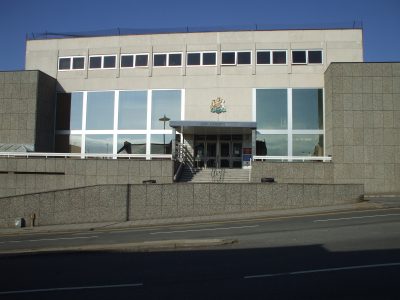A football fan who threw a lit flare on to the Amex pitch in May after a Brighton and Hove Albion match was fined just £80.
The smoking blue flare was thrown on to the pitch after Brighton’s final home match last season against the Premier League champions Manchester City.
City fan Hugo Bransby, 21, pleaded guilty at Brighton Magistrates’ Court yesterday (Wednesday 25 October) to throwing the missile – but he was not given the three-year football banning order sought by the prosecution.
The magistrates called it a “momentary lapse” in his usual behaviour and accepted that he did not bring the flare into the Falmer stadium or light it – and that no players on the field were injured.
Bransbury, of Arthog Drive, Manchester, threw the flare from the Amex Stadium south stand, where away supporters had been seated, after it was lit and given to him by a friend.
Brighton and Hove Albion said: “As a club we welcome the verdict but the individual is lucky only to be facing a fine for his ‘momentary lapse’ of judgment.
“Not only should he be facing a banning order but, had things taken a turn for the worse, he might have been living with a much tougher ‘sentence’ as a result of the consequences of his actions.
“The use of flares and pyros in this way is incredibly irresponsible and endangers fellow supporters and club staff.
“We have a zero-tolerance approach to anyone bringing flares, pyros or similar into a football stadium.
“We support the CPS in their approach and we would urge the authorities to take the strongest possible action against those caught in possession.”
Bransby, a Bristol University student, was detained by police as he left the ground on Wednesday 24 May and immediately admitted his actions.
At the sentencing hearing yesterday he said: “I have really tried to learn from this and better myself. I completely acknowledge that this was a reckless moment and I’m entirely, completely remorseful for this.
“This has been a very harrowing experience in many cases and put a lot of pressure on me and my family as well.”
When one of the magistrates asked why he threw the flare and whether he had been drinking alcohol, Bransby said that he had not been drinking.
He said: “I’d actually driven to that game so I had not been drinking at all. I wish I had an answer.
“It was such a reckless decision, such a complete lack of judgment, and I have no excuse. I honestly have no excuse.”
Julia French, prosecuting, said that Bransby should be given a football banning order for three years, barring him from all grounds on match days and from certain Manchester pubs.
She said: “This offence which, while on the face of it, may appear to be an isolated incident committed by a person of a good character could trigger widespread disorder.
“Football is of course in the public domain and positive action should be seen to try to eradicate problems within football matches.

“Flare possession and throwing flares onto the pitch is becoming an increasing problem for Sussex Police.
“They take a stern line in respect of it and you’ve also heard that football clubs themselves or Brighton and Hove Albion certainly take a very stern line when it comes to flare possession.
“This was an offence that was committed while being broadcasted live on Sky Sports and so potentially being viewed by people around the world.”
Chloe Carvell, defending, said that the football banning order would be “excessive” for someone with no other recorded football-related issues or offences.
She said: “A football banning order is a preventative measure and shouldn’t be imposed just to punish somebody. It’s there to prevent. It’s a civil order.
“If this defendant has, which he has done, attended a number of matches since this incident without any problem at all, what would be the benefit in now saying he’s banned from attending matches when effectively, in my submission, I say he’s learnt his lesson.
“Mr Bransby didn’t provoke any violence. He accepts he made a stupid decision by throwing a flare when somebody passed it to him but fortunately nobody was hurt.”

At the hearing yesterday, PC Carl Smith told the court that 31,000 people had attended the game.
He also spoke about football banning orders generally, saying: “They’re designed to prevent any act of violence or disorder in football grounds or before or after fixtures.
“They’re a deterrent for avid football fans because they like following their team around the country. We see a lot of people who would rather take a conviction than a football banning order.”
Miss French said that Bransby’s conviction for a football-related offence meant that the bench were obliged to impose a football banning order if sought – unless it was unjust.
The magistrates – Alison Musker, Alison Thomas and Denise Lawson – decided that imposing the football banning order on top of a fine would be unjust in this particular case.
The presiding magistrate Alison Musker told Bransby the he would have to pay a court bill of £197, including the £80 fine, the prosecution’s court costs and a victim surcharge, within 28 days.









Silly boy really doing this. I agree with the sentiment that he was lucky not to have been given a banning order.